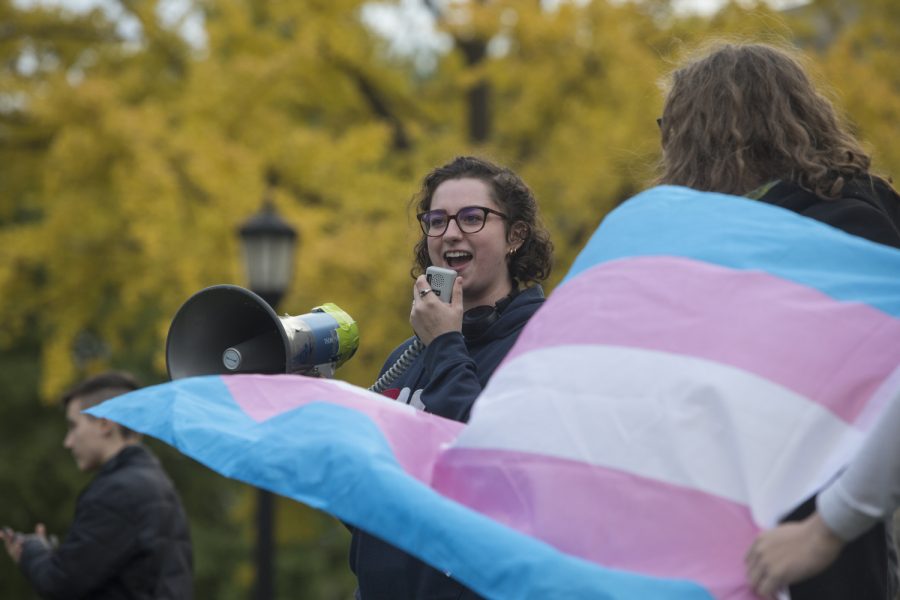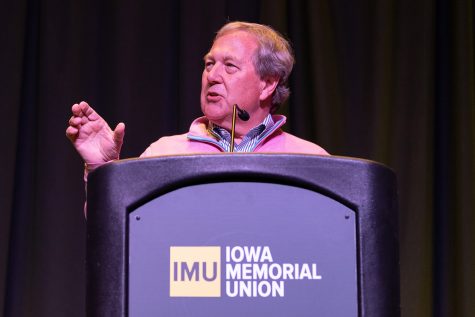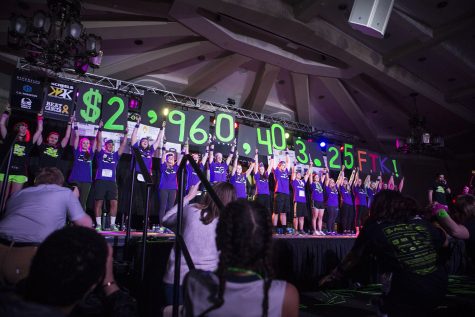Banerjee: Transgender Day of Visibility invisible on campus
Sunday was the International Transgender Day of Visibility, but the university was essentially silent as trans students shared their stories.
Margo O’Neill addresses the crowd during a transgender rights rally on the Pentacrest on Thursday, Oct. 25, 2018. Protesters gathered to promote rights in light of the upcoming elections.
April 1, 2019
I distinctly remember being 14 years old and reading through article after article about Leelah Alcorn, a young transgender girl who killed herself in December 2014. It was the first of many deaths, murders, and suicides that would color my high-school years and my mindset now.
Her death hit me at a particularly vulnerable moment, for me, for my friends, for my community as an LGBTQ+ teen. Trans people face astronomically high suicide rates, and those numbers are even higher for trans teens. Last year, a study by the American Academy of Pediatrics found that, for teens, more than half of trans-male participants reported attempting suicide, with nearly 30 percent of trans women reporting the same. Trans-murder rates are similarly high.
The International Transgender Day of Remembrance is Nov. 20, established in 1999 by Gwendolyn Ann Smith, a trans woman. While this day is critical to memorializing and recognizing the pain that has been inflicted upon the trans community, four months later, annually on March 31, a twin event happens: International Transgender Day of Visibility.
RELATED: LGBTQ Safe Zone: Trans Awareness Workshop (for UI Health Care)
While it was founded in 2009, there was a resurgence of the event around 2015 that allowed it to rise to a wider scale, more recognizable observance of trans lives and trans love. Social-media campaigns, using the hashtag #TransDayOfVisibility (or simply #TDoV), share selfies and photos from trans people across the world, proud of their identities, their achievements, and their lives. If the Transgender Day of Remembrance is a memorial, Visibility Day is a celebration.
And, in the face of this, I wonder where the vocal support of trans lives are from the UI, which seemingly wishes to want to do so much for trans students. If trans students only matter in the context of gender-neutral bathrooms, is that equality?
The LGBTQ+ community is one that, despite everything we go through internally and externally, is bonded by this celebration of life and love. Few communities have such a reason to be so proud of continued life as the trans community, and as someone who is not trans, I can only offer my continued support.
RELATED: United Methodist Church faces backlash from local congregations
On campus, there is only one event in relation to Visibility Day: a screening of More Than T, a documentary directed by Silas Howard, a trans director. While this is good, the lack of acknowledgment of the day in general by the UI or affiliated spokespeople causes me some concern.
Trans politics have been historically difficult for the university to tackle, from improper language in UI events to social injustices in classrooms and outside of them. I’ve heard the stories of those who have faced discrimination or near violence on campus. I don’t know the fear trans students specifically feel, but I know how I feel at night walking home from work at night as an LGBTQ+ student.
And, in the face of this, I wonder where the vocal support of trans lives are from the UI, which seemingly wishes to want to do so much for trans students. If trans students only matter in the context of gender-neutral bathrooms, is that equality? The university and and organizations such as CommUnity (formerly the Crisis Center) or the Women’s Resource & Action Center do well to support trans and LGB+ communities, but the lack of vocal support from the faces of the UI disconcert me. Trans lives matter even when they’re not referred to solely in remembrance.




















